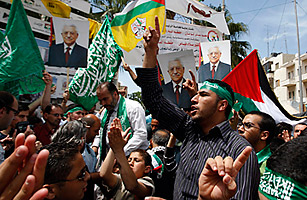
His captors put out cigarettes on Haitham Amro’s body. His thighs were a carpet of bruises, green, yellow and blue, and his back striped by lashes. The angle of the wounds on his wrists indicated he had been suspended above the ground by handcuffs for some time before his corpse was brought, on his fourth day in custody, to the hospital where they recognized it immediately, Amro having worked there for years as a nurse.
But to the men who tortured him to death on June 15, 2009, the only identity that mattered was “Supporter of Hamas,” the Islamist group that controls the Gaza Strip. But Amro didn’t live in Gaza. He lived in the West Bank where another faction, Hamas’ rival, Fatah, holds sway in the guise of the Palestian Authority . A West Bank court eventually put five P.A. security officers on trial for Amro’s torture and death but only after huge pressure on the Palestinian Authority.
The two factions this month signed an agreement heralding unity and reconciliation. Since that ceremony in Cairo, Hamas flags have flown in the West Bank, and Fatah standards in Gaza. But on the very day of the signing, Hamas executed a member of Fatah that a court in Gaza convicted of collaborating with Israel. The day before, smartly uniformed forces controlled by Fatah arrested more Hamas prisoners on the West Bank. Still Amro’s murder may be the most concise and well-known case study of the emotions stirred by the rift between the two Palestinian groups and that continue to tug stubbornly against full reconciliation.
“What happened is a cause of the black division between Fatah and Hamas,” says Nidal Amro, one of eight surviving brothers he left behind . “The men who did it were not given direct orders to torture my brother. They did it from hate.”
Palestinian families have long been divided between Hamas and Fatah. “In his soul, in his beliefs, my brother considered their way the right way,” says Raad Amro, another brother, referring to Haitham’s support for Hamas But he never spoke of politics at home out of respect for his father, who always favored Fatah.
The rivalry between the groups turned vicious after Hamas won a surprise victory over Fatah in 2006 legislative elections that had been urged by President George W. Bush. The outcome alarmed Washington, which began urging Fatah to challenge Hamas militarily. But when fighting broke out the following year, Hamas fighters needed just days to drive Fatah out of Gaza. Some Fatah fighters were pushed alive from the tops of high buildings. Others were dragged half-naked through the streets. The memory of the brutality features in the abuses suffered by Amro during his detention. “They dealt with Haitham as if he had come from Gaza to kill,” says his brother Nidal.
Amro was beaten from the day he was taken into custody by P.A. officials while feeding chickens at his house south of Hebron. Shawan Jabarin, director of the Al Haq human rights organization in Ramallah in the West Bank, said the prisoner suffered immediate spinal damage that prevented him from raising his arms to his face. By the last beating, he could not walk and had asked other prisoners to take care of his children.
What kept the case in the public eye was connections. Amro’s brother Nidal works as top assistant to Jabril Rajoub, now the head of the Palestinian Olmpic Committee but who was once a senior Fatah official in charge of security under Yasser Arafat. Rajoub, who spoke at Amro’s funeral, would be among the senior Fatah figures who prevented the West Bank government from sweeping aside the scandal. At first, the Palestinian Authority’s General Intelligence service claimed that their prisoner had leapt to his death
Jabarin, the human rights advocate, sharply criticized the acquittal but says the PA’s General Intelligence bureau has show evidence of reform, recently opening its jails to unannounced visits. The number of Hamas prisoners, at 146, is less than half the number of a year ago. In Gaza, Hamas holds no more than 50 from Fatah. But for reconciliation to work, Jabarin says, the factions must establish a transitional justice program that holds accountable those who tortured and killed.
“This is one of the main challenges we will face, how to remove this issue from the path of reconciliation,” says Rajoub. “But I do believe that in spite of the bitterness, the sorrow of losing a beloved person, national reconciliation should be helpful in overcoming it. There will be a mechanism as part of the solution on dealing with this so-sensitive element. It’s not easy.”